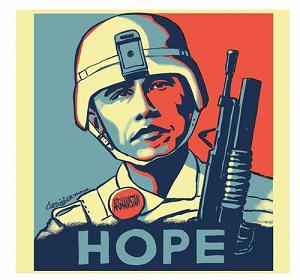US Troops to Niger: A New Stage in the Scramble for Africa

President Barack Obama’s terse notification to Congress last week that American troops are being deployed to the northwest African nation of Niger confirms that a whole new stage in the imperialist recolonization of Africa is now in progress.
The dispatch of the first 100 troops—with hundreds more reportedly to follow—is bound up with a deal signed last month between Washington and the Niger government allowing the US military to set up a drone base on the country’s territory, creating the conditions for spreading the Obama administration’s remote-control killing spree throughout the region.
The buildup of US forces in Niger comes in the immediate wake of last month’s French intervention in neighboring Mali, carried out with critical US logistical and intelligence support, and aimed, in the words of French Defense Minister Jean-Yves Le Drian, at the “total reconquest” of the former colony.
Both Paris and Washington have justified their military incursions into the African continent in the name of defeating Al Qaeda and associated organizations in Africa. British Prime Minister David Cameron chimed in last month, warning that the prosecution of this war in Africa could span “decades.”
The glaring contradiction between this pretext for war in Africa’s Sahel region and the line-up of these imperialist powers behind Al Qaeda-linked militias in the sectarian-based war to overthrow the Assad regime in Syria is passed over in silence by the media and the political establishments in all three countries.
No one in the US press, for example, bothered noting that Obama’s announcement of the deployment of US troops in a supposed war against Al Qaeda in Africa came on the same day that Washington blocked a United Nations Security Council resolution condemning an Al Qaeda terror bombing that massacred scores of civilians in Damascus.
Behind the incoherence of the pretexts for imperialist intervention, the real forces driving it are clear. Washington finds itself being economically eclipsed in Africa by China, which has emerged as the continent’s leading trade partner. Increasingly in competition over strategic resources—West Africa is soon expected to account for 25 percent of US petroleum imports—US imperialism is relying on its residual military superiority to combat this economic challenge.
In the prosecution of this predatory strategy, Al Qaeda serves a dual purpose—providing shock troops for the toppling of regimes seen as obstacles to US hegemony, and serving as a pretext for other interventions carried out in the name of combating “terrorism” and “extremism.”
Setting up the new base in Niger places US drones just across the border from Nigeria, which until recently has supplied 10 percent of US foreign oil imports and where the Pentagon has grown increasingly involved in an internal conflict involving Boko Haram, an indigenous Islamic sect that appears to have no ties to Al Qaeda nor any ambitions outside of Nigeria.
In light of these developments, the significance of the US-NATO intervention to bring down the regime of Colonel Muammar Gaddafi in Libya in 2011 emerges with ever greater clarity. Claiming the lives of some 80,000 Libyans and leaving an entire society in rubble, this was the first war to be commanded by AFRICOM, the regional command set up under the Bush administration in 2007. It was waged to pave the way for new and more far-reaching military interventions.
The Gaddafi regime served as the linchpin of security and economic relations that maintained a semblance of stability in the Sahel region, providing economic aid, for example, that served to cushion the longstanding conflicts between the Tuareg people and the regimes in Mali and Niger.
The toppling and murder of Gaddafi had the altogether foreseeable consequence of destabilizing the region, sending Tuaregs fleeing Libya into Mali, followed by the very Islamist elements that Washington had backed in the war for regime-change in Libya, and thus providing the pretext for both US and French imperialism to intervene again, putting troops on the ground in the region.
Plans for these interventions were well advanced before the first bomb was dropped on Tripoli. The region has been a focus of US strategic calculations for the past decade, beginning with Washington’s Pan Sahel Initiative in 2003, followed by its Trans-Saharan Counter-Terrorism Partnership in 2005.
In this context, the role played by a whole layer of pseudo-lefts internationally in justifying and promoting the war against Libya, touting it as a humanitarian intervention, a crusade for democracy, and even a “revolution,” also becomes clearer than ever.
The academic Juan Cole of the University of Michigan used his inflated reputation as a critic of the Iraq war to sell the war in Libya. Gilbert Achcar, a member of the international Pabloite United Secretariat and a professor at the School of Oriental and African Studies in London, condemned NATO for not dropping more bombs on the country. And organizations ranging from the Left Party in Germany, to the New Anti-capitalist Party in France, the Socialist Workers Party in Britain and the International Socialist Organization in the US all engaged in the dirty work of politically legitimizing a predatory imperialist war.
The pro-war positions taken by these individuals and groups—in both Libya and Syria—reflect the evolution of a whole socio-political layer rooted in affluent sections of the middle class, which, with varying combinations of political calculation and ignorance, have come to identify their material interests with those of their “own” imperialist powers.
In the context of the escalating imperialist drive to redraw the map of Africa, these elements stand completely exposed as intellectual and political “assets” of the CIA and the Pentagon.
It follows that a genuine movement against war and colonialism can be developed only through the independent political mobilization and international unification of the working class in struggle against the root cause of war, the capitalist system. With the events unfolding in Africa, this perspective has been thoroughly vindicated.

